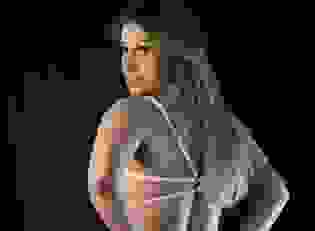Note: You can change font size, font face, and turn on dark mode by clicking the "A" icon tab in the Story Info Box.
You can temporarily switch back to a Classic Literotica® experience during our ongoing public Beta testing. Please consider leaving feedback on issues you experience or suggest improvements.
Click hereI lived in my head when I was a kid. Peter did too. I liked it up there, even if it DID make me seem a bit absent minded and aloof. Later on people would use the term "alienated" to describe the condition. I honestly don't know what it was. All I knew was that I didn't care what other people thought and I was certainly not interested in any aspect of their humdrum lives.
Call it arrogant if you like. But honestly, I wasn't judging anybody. I simply didn't share the interests and values of the people around me, and my imagination let me soar past the limitations of my situation. I was comfortable in my own world, and I had no intention -- or perhaps I was incapable -- of changing. It was an addiction. Consequently, I understood my odd little son's foibles better than anybody else.
Prior to meeting Jane and Peter I was tied to nobody, and nothing. I could go anywhere and observe without getting involved in the situation. If that describes the perfect temperament for a reporter, then so be it. Still, it made me come-off like a loner.
Of course Jane and Peter's arrival completely altered those circumstances, and, in my mind, it was for the better. Now I had a life companion, an equal who I could share that worldview with.
Jane was stunningly attractive, an exquisite little doll of a woman with a sex drive that would satisfy any man. But those physical qualities were such a minor part of the person I loved that they are hardly worth mentioning. It was Jane herself.
Without knowing anything about my wife's interior landscape I sensed that there was a lot more going on inside her head than she was allowing anybody to see. I mean... Peter had to get that IQ from somebody and by all accounts Nigel was just an ordinary bloke.
Like me, Jane had a love of ideas and a wide-ranging imagination. But unlike me she had non-negotiable principles. I never thought about right-or-wrong. I just did my job. But Jane really believed in the importance of abstract things like civility, courage and commitment and she had transferred all of those ideals to Peter.
Of course Peter's native intelligence was fertile soil for those concepts to flourish and blossom. Peter was a certified genius, all the tests said so. But it was his innate seriousness, his dreamer's mindset and his romantic soul that set him apart from the other little boys.
At age ten, he should have been out on the sidewalk getting into trouble, not hanging around in the house reading Scott, Kipling, Stevenson, Burroughs and even H.G. Welles. But the worlds that those authors had created were the places where Peter wanted to be.
That's not to imply that my son was some kind of namby-pamby weakling. He was taller than most boys, and physically gifted. So, there wasn't any sport that he didn't excel at. It was humiliating to be beaten by a ten-year-old in tennis. He was a streak of greased lightning as a winger in Rugby and he could deliver a leg breaking spinner in cricket that adults couldn't hit.
It was just that Peter had no interest in competition, except when the school made him do it. He was happiest when he was exercising his brain. I was just like Peter when I was that age, too busy with my writing to do any sports. Hence, there was no doubt in my mind that he was my boy.
I think it was our shared nature, call it intelligence if you like, that was the glue that bound us so tightly to each other. But whatever the reason, I was raising a young man who wanted more than anything else to grow up to be just like me.
A little boy's love is a huge boost to any man's ego, and it made my life very happy. Consequently, I'll always believe that the best thing that ever happened to me was to run into Jane and Peter that night in the Underground bomb shelter.
And that was the way it was right up until December 7th, 1941.
*****
Things accelerated a lot once the U.S. got into the war. At first it was just the demand for stories about the arrival of the first American units in the U.K. I also made a number of new acquaintances in the press corps as American correspondents flooded the place.
Some were draftees, college kids like Andy Rooney, from Colgate and Walt Cronkite, right out of the University of Texas. Others were seasoned professionals who were there because that's where the action was, like Martha Gellhorn and Ernie Pyle. Both of them were veteran war correspondents. In fact it was Gellhorn's flaming affair with Hemingway during the Spanish Civil war that broke up his marriage.
I wasn't in Gellhorn, or Pyle's league. But I was exempted from the draft because I'd been reporting on the war for almost two years, and I was still a minor celebrity due to my unceremonious exit from the Reich. Still, my draft exemption didn't stop me from becoming part of the military.
I didn't mind that at all because it gave me GREATER access. And since we were embedded, we got our own uniforms. They looked like an American officer's, except there was a patch that said, "War Correspondent." So, I frequently found myself on the receiving end of salutes although I wasn't officially an officer.
February to May, I covered the arrival of Army Air Force units. The strategic bombing campaign was still a month away, but I was filing stories almost daily about the preparations. I'd take the train up to High Wycombe in the morning, do interviews and return on the evening train to write them up and file them.
Then, once the Mighty Eighth got to work all of us correspondents would take a different bomb group and interview the crews when they got back. That brought on a lot of survivor's guilt because one or two crews a mission never returned.
I don't know who came up with the idea, but we all decided to experience a bombing raid. Jane told me that I was an idiot. She'd already lost one husband that way. Peter thought it was the most exciting adventure he'd ever heard of.
Reporters weren't allowed to carry weapons. But we all had to do a short intensive stretch at gunnery school in case they needed us in the air. I took a couple of.50 caliber shell casings back for Peter. He was thrilled.
As I was climbing into my assigned B-17 that morning, I thought to myself, "What the fuck am I doing here??!! I'm scared shitless." But I'd gotten to know all those guys and they were doing this every day. So, I felt like I owed it to them to try it at least once.
They situated me in the middle of the aircraft with the waist gunners. The flight engineer was temporarily back there too. He manned the top turret on our flying fortress. So, he was up front with the pilots while we were over enemy territory.
The ball turret gunner was with us too, until he had to squeeze into his infernal contraption. Ball gunners always waited until we were well into the air before they mounted up because an engine failure on takeoff would have produced a long red streak.
The mission was considered to be a "milk run" in military terms. Just over the sub pens at Lorient and Saint-Nazaire. The German fighters were concentrated over the Reich. Thus, the only hazard was flak.
They'd given me an armored flak vest. But the plane had to hold a straight and level course once it started its bombing run, which made us sitting ducks. So when the navigator announced we'd hit the IP, I took off the vest and stood on it.
Elwood Barnes, who everybody called "Hound" was the right waist gunner. He stared at me in amazement and said, "What the hell you doin' Scheffler?" I said, "I'm protecting myself from the flak." Everybody on the intercom began to laugh at me.
The pilot said kindly, "Flak comes from everywhere Ace, not just underneath us." He was right. Towering black clouds, with fiery red centers began to burst at every altitude and spent shrapnel bounced off the bomber's metal hide like hail on a tin roof. I hastily scrambled back into my vest. It was an experience I'll never forget - and would never want to do again.
It should be clear that life as a bomber crewman took extraordinary courage. Every man on my aircraft got up the next morning, while I was sleeping next to my beautiful wife, and trudged out into the breaking dawn to try their luck again. And THAT in my opinion, was the definition of a hero.
They had to do twenty-five missions before they got shipped home. Short-Snorter, the plane I was on, made twenty-one before a 109 got them over Wilhelmshaven and they joined the almost fifty percent of the crews that never made it back.
Speaking of heroes. The American servicemen were just kids and like any group of kids, some of them were stupider than others. So the usual drunken incidents would happen once-in-a-while, particularly with the women. The Brits described it as, "Overpaid, oversexed and over here." It was all in good fun, unless it happened to you.
Jane was always modest and polite. But she would stand out in any group of women. We rarely went out to eat, there was too much rationing. But Peter had aced the tests that they used to determine entry to Cambridge, and we wanted to celebrate.
By age 13, Peter wasn't my little pal anymore. He was almost as tall as I was and slender but solid. He was gentle, polite, and considerate, unlike most teenagers, and his choir-boy features had matured into a manly beauty. Even so, Peter was no pretty-boy. He radiated strength and self-confidence.
I was settling up the dinner bill while Jane and Peter went out into the High street to wait. Once I'd finished paying, I walked out in the fading evening light to discover that neither of them were anywhere to be found. Puzzled, I looked around. Then, I heard loud laughter and taunts from the alley.
Curious, I walked around the corner and saw a scene that was so gallant that my heart lurched. Three drunk-on-their-ass Yank privates had cornered Jane and Peter. Jane must have walked around the building to get away from them and they'd followed demanding that she, "Give us a little kiss, love."
The English fight best when their backs are to the wall and in the present situation, Peter was the English archers at Agincourt, or the thin red line of Sutherland Highlanders saving Raglan's ass at Balaclava. My son had to know that he was a boy facing three grown men. But honor and duty demanded that he stand, and fight, and he clearly wasn't going to take one further step back.
Peter was shielding his mother, holding a length of discarded wood in front of him like a cricket bat. His handsome face had the same cool expression that Wellington must have had, as volley fire from the Iron Duke's unwavering redcoat squares destroyed the French cavalry at Waterloo. The three morons were laughing at Peter's steadfast demeanor. But they also weren't challenging him.
I came up behind and shouted at the top of my lungs, "TEN-HUT!!!" They might have been drunk but they'd respond to that command, even if they were dead. All three stiffened to attention. I said in the same tone, "About face!!!" They turned looking sheepish.
In the waning light, they saw an American officer. The Army had given me wings to commemorate my one bombing raid and my crush cap was the same as an American pilot's. It wasn't an affectation. I wore it to honor the guys on that plane. It was my right to do so. I'd faced death with them.
I said with utter contempt, "What are you knuckleheads doing to these two British CIVILIANS!!" The three stooges were shaking in their boots. American officers hammered good behavior into every soldier's head. We might be there to help save the Brits' ass. But we were guests in their country. So, those idiots knew that I was going to shit on them from a very great height.
The one in the middle slurred, "Nuuthin Sir, just havin' a little fun." I said, "Well go have your fun somewhere else and apologize to the lady before you leave." They all turned to Jane and said shamefaced, "Sorry Mam we didn't mean nothin'." Then they slunk down the street with their tails between their legs.
All the time that was happening, Peter had his arm protectively around his mother's shoulders. Jane, of course, looked as calm and in-control as ever. It wasn't hard to see where Peter got his courage. My son looked at me and said, "I was just trying to hinder them Father. I knew you would eventually intervene."
If you're lucky you will love a kid like I loved Peter. I thought to myself, "What kind of thirteen-year-old uses words like hinder and intervene?" Most teens would either be bragging, or blubbering, not discussing their defensive strategy like Winston Churchill.
*****
The war took a decided turn for the better the following June. I covered the landings from the heavy cruiser Augusta which was Bradly's headquarters ship and during the breakthrough at St. Lo and the Falaise pocket, I commuted back and forth between London and the fast-moving allied front.
Patton was a publicity junkie. That was the reason why I was with the French 2nd Armored Division when they branched off to liberate Paris.
It was a totally wildcat operation. The Third Army was supposed to be chasing the Germans back behind the Rhine, not taking side trips. But De Gaulle was worried that the allies would put Paris under martial law when they chased the Germans out, and he wanted to beat them to the punch by getting control of the city himself.
It gave me a chance to meet my personal hero, Hemingway. Four of us newshounds were in a jeep moving through the town of Rambouillet 35 miles southwest of Paris when we were stopped by a group of French partisans, who tried to requisition our jeep. Bob Capra, who was driving, insisted on talking to their commanding officer and to our utter astonishment they produced Hemingway.
I recognized him immediately. I mean... I'd seen enough of his book jackets. Papa was standing with his shirt open big belly hanging out sweating in the June sun. He had a bottle of red in his hand which he was swigging from like it was a canteen.
He claimed he had "taken over the defense of Rambouillet" and his "troops" who appeared to be about a hundred scruffy looking French, would be liberating the Ritz hotel on the morrow. I just HAD to see that. So, the next morning we followed a column of French M4s up the road to Paris.
We camped in the Meudon forest that night and Ernie got drunk on a bottle of cheap scotch that Sam Marshall had with him. The next morning we crossed the Pont de Sevres dodging snipers as we entered Paris and Hemingway was drunk again by mid-morning.
That was to be expected, given the amount of champagne he'd guzzled along the way in. In fact, it was a wonder that any of us had made it as far as we had because the French were handing us bottles of bubbly as soon as we cleared the Bois de Boulogne.
We liberated Harry's New York Bar first. That was because that place was the Lost Generation's hang out before the war. Now, it was managed by a black guy named Tyler P. Boggs.
Boggs was part of the OSS's legendary Black Rattler network, which was a collection of African-American ex-pats. Even Josephine Baker worked for them for a while. They were invisible to the Nazis because they were servants and entertainers. But they heard and saw everything. In fact, the Rattlers were the OSS's most effective source of intel concerning the City of Paris.
Meanwhile the city of Paris was going nuts around us. The girls were all in colorful outfits, with big flashy earrings and they were hugging and kissing anybody in a jeep. Everyone was throwing flowers. But the killing was still going on. You could hear the sporadic wham-bam of tank rounds and the rattle of machine-guns over all of the happy tumult.
Hemingway was wearing a pistol and a belt that he'd taken off a dead German during the dust-up that we'd had over in the Sixteenth Arrondissement. Now he was playing soldier in violation of the all the rules about correspondents staying out of the war. But of course Papa was famous and the rest of us, including the ragtag bunch of French resistance fighters who he'd recruited -- were not.
Late in the afternoon, our party of dusty jeeps pulled up at the back door of the Ritz on the Rue Cambon. The manager met us, head bobbing like it was on a string. He kept assuring us that the Ritz had done its bit for La Resistance by keeping the finest wine safe from the Boche. He kept saying over-and-over, "We saved the Chateau Cheval Blanc! We saved the Chateau Cheval Blanc!"
Hemingway said with exasperation in his voice, "Well then go get it!"
So, we spent the rest of the day sweating, telling stories about imaginary military triumphs, and slugging down truly rare Bordeaux like it was Coca-Cola. I had a million anecdotes like that. I recorded all of them and sent them down the wire to my readers in the States.
I lived a schizophrenic life during that period. I had my peaceful and happy family when I was in London, which was really a short ride away on one of the C-47s that shuttled constantly between Le Bourget and Croydon. It was like the war didn't exist in our comfortable little bubble in Kensington.
But when I was covering the action in France, I witnessed an endless string of violent encounters. Even though I was with Patton, who was rarely in harm's way, I was aware of the death and destruction around me.
That was the way it was until the day that my life was snuffed out in an instant.
*****
I was staying in the Hotel Scribe, which was the former Paris headquarters of the Nazi Ministry of Propaganda until we ink-stained wretches of the press liberated it. Now, there were so many correspondents sitting around the hotel bar that it looked like the newsroom of the Times.
It was a couple of weeks before Christmas and I was just finishing breakfast. I was preparing to file a story about the British efforts to liberate Holland when a desk page told me that I had an urgent call from the States. Puzzled, I walked over to the telephone bank.
As I'd suspected, it was Wechsler. Normally he's as manic as a squirrel in nut hunting season. But his voice was measured and grave. My hair stood on end. I immediately knew that this was bad news.
He said gently, "Sit down before I tell you this."
I sat and said, with real fear in my voice, "What is it!!! What happened!!??"
I can't recall anything after that. The long-and-short was that there had been a V2 strike in London and our house had been ground zero. Wechsler had gotten the early news because one of his reporters had covered it and Jim felt like he should break it to me personally.
The Nazis had recently started using the Vergeltungswaffe, or V2. The V2 was wildly inaccurate. So, it had no conceivable military purpose. But It was the supreme weapon of terror. It just appeared out of blue heaven like the finger of God packing a ton of Amatol. And if you were standing in the bullseye you died.
Nobody knew much about them except that they were the ultimate in cowardice. At least the allies braved flak and fighters to bomb German cities whereas the V2s were launched from the safety of the Vaterland with no risk whatsoever to the Nazi pulling the trigger.
I suppose people who've unexpectedly lost a cherished loved one will understand the state that I was in. It wasn't sorrow. Sorrow's a trivial emotion. It was the most acute sense of utter despair and misery. My only thought was, "Why should I go on?" So, I retreated into my subconscious and barred the door.
Wechsler was the person who alerted the staff. He'd spent a minute or so saying, "Hello!! Hello!!" and when he got no response he hung up and called the front desk. They found me catatonic in the phone booth gripping the receiver like I was trying to crush it. I wasn't passed out or crying. I was just sitting there like a statue.
The shrinks call it a fugue state. I have some recollection of the intense pain as the demons of regret swooped and screamed through the empty halls of my mind. But I was basically dead until the following morning. I awoke in a ward at the American Hospital of Paris. There was a second of confusion and then it all came back to me, and I yelled, "Oh no!!"








